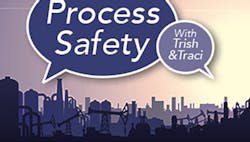Podcast Boosts Safety Message
“If you don’t know where you’re going, any road will get you there.” Lewis Carroll penned those words for “Alice in Wonderland” and Trish Kerin, director of the IChemE Safety Centre, Melbourne, Australia, dusted them off for her talk to a global audience at the Women In Safety Congress on March 9. The virtual Congress, held in celebration of International Women’s Day, strove to help women improve safety, reduce incidents and save lives at their facilities and workplaces.
Kerin was pointing out to attendees that you must have a plan in place to move any initiative forward. Regarding safety, you also must be humble and willing to admit you don’t have all the answers. Indeed, a mistake that Kerin made early in her career led her on the path to becoming a champion for process safety and, ultimately, to the role of director at IChemE, which is an industry consortium run by the Institution of Chemical Engineers. Before taking up her role with the professional group, she gained substantial industry experience in the oil, gas and chemical industries.
Chemical Processing is fortunate to have a partner in Kerin for its Process Safety with Trish & Traci podcast series. Each podcast discusses actual process safety incidents at chemical facilities or, sometimes, relevant ones in facilities at other sectors, in a way that’s tailored to provide valuable guidance to chemical industry professionals. The half hour or shorter sessions offer insights into how these events might have been prevented or, at least, mitigated, as well as appropriate next steps and, importantly, lessons learned from catastrophic accidents. I produce and host these podcasts but Kerin serves as the expert.
We have nearly two dozen podcasts in the series and will continue to create more. Here are the five most-listened to episodes.
No worries! Subscribe and listen whenever, wherever.
Is Inherently Safer Design Really Safer?
Born out of Trevor Kletz’s 1978 article entitled, “What You Don’t Have Can’t Leak,” inherently safer design focuses on design philosophy. In this episode, Kerin points out that inherently safer design choices are actually trade-offs and we have to pick the least objectionable option. She also highlights four fundamental ideas to look at from inherently safer design.
What Have We Learned From Significant Safety Incidents?
“That can’t happen here.” Those are very dangerous words, warns Kerin. This podcast points out that while it’s easy to judge accidents after the fact, judgment doesn’t help prevent tragedy. You must really unpack why the decisions were made to avoid repeating them.
(Editor’s note: Kletz offered his thoughts about the hard lessons learned from the worst chemical incident ever in “Bhopal Leaves a Lasting Legacy”.)
Cybersecurity: It’s Not If You’ll Be Hacked — It’s When.
How are you taking care of operating systems, and does it suffice in terms of cybersecurity? This episode talks about how best to expose and resolve vulnerabilities and discusses what can happen if you lose access to your entire enterprise system.
Lessons Learned from the Longford Gas Explosion that Killed Two
A heat exchanger, management-of-change issues and a gap in knowledge led to a catastrophic incident in the U.K. All of these were preventable mistakes. This episode examines the Esso Longford gas explosion. Sadly, all the mistakes were nothing unheard of — simply a chain of errors that caused the deaths of two workers.
Focus on the Right Process Safety Indicators
The absence of an incident doesn’t mean the presence of safety. Focusing on the correct indicators can help you intervene and potentially change the future. This episode points out that when the measure becomes a target it ceases to be a good measure.
You can access all of the Process Safety with Trish & Traci episodes, including the transcripts, here.
Want to suggest a topic for the series or think you’d make a good podcast guest? Email me at [email protected].
To borrow two very important words from Kerin — stay safe.
Traci Purdum is Chemical Processing's Senior Digital Editor. You can email her at [email protected].





